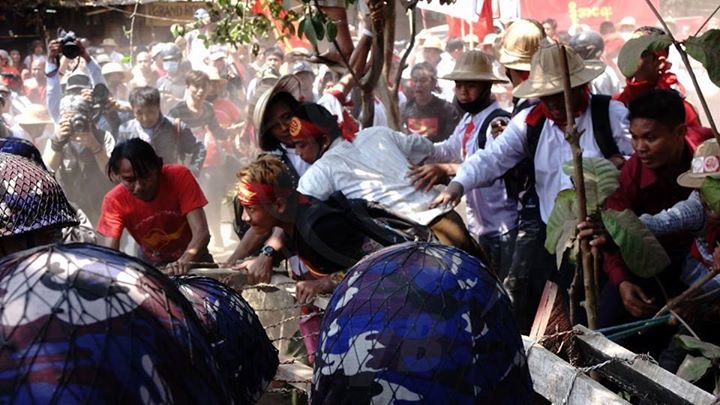Burmese President Thein Sein and his backers would have you believe the upcoming national elections are a gift bestowed upon the country by its former military rulers. The truth is that next month’s polls are the culmination of decades of struggle and sacrifice by activists, students, monks, journalists, and many others.
Unfortunately, many of those who have recently taken up the mantle of the pro‐democracy movement will spend election day behind bars, wrongfully imprisoned for exercising their rights.
Earlier this month, Fortify Rights and the Harvard Law School International Human Rights Clinic published key findings of a joint investigation into a 10 March police crackdown on student protesters in the small town of Letpadan, approximately 70 miles north of Rangoon.
The 80‐page report, which I helped write, is available in full for the first time today.
We found that Myanmar authorities violated the protestors’ rights to freedom of assembly and expression by enforcing a police blockade in Letpadan and imposing unreasonable restrictions on their protest activities. We also found that police officers used excessive force to disperse and arrest the protestors on 10 March, beating, kicking, and punching unarmed protestors.
The violence by police in Letpadan was captured on film and in photos, uploaded to social media in real time, and broadcast to the world. But the abuses didn’t stop there. Our investigation revealed that after the cameras stopped rolling, the abuses continued. Police brutally beat protestors who were already in police custody, in some cases while their hands were bound.
The police arrested 127 individuals on that day in March, and other student leaders and activists were detained in the weeks and months that followed. Fifty of those arrested at Letpadan remain in prison and face criminal charges relating to rioting, harming public servants, and public mischief. If convicted, they could spend a decade in prison.
There is little or no evidence to support the charges against the students. The confrontation in Letpadan was precipitated by the government’s failure to facilitate the peaceful exercise of rights guaranteed by Burma’s constitution and international law. Moreover, police officers were overwhelmingly responsible for the violence that occurred on 10 March, and student leaders repeatedly urged their colleagues to refrain from violence.
The trial at Letpadan Township Court has been a farce and often delayed. On 15 September, the judge charged defence lawyer Khin Khin Kyaw with disrupting the court, in apparent retaliation for a motion she filed stating that police officers should be held responsible for the excessive use of force in Letpadan. Khin Khin Kyaw now faces six months in prison and the loss of her law license.
Earlier this month, authorities offered the detained protestors the opportunity to cast ballots in advance voting prior to the elections. This is a small consolation. The government’s fear is not the students’ presence at the ballot box in November, but rather their power in the streets. The ongoing detention and prosecution of these individuals is a boldfaced attempt to decapitate an outspoken student movement with popular support in the run‐up to elections.
[related]
Unfortunately, the activists arrested at Letpadan are not the only ones likely to spend the election period behind bars for exercising their rights. Amnesty International recently published a briefing that identified 91 prisoners of conscience locked up by the Burmese government as part of a broad campaign of political repression. These individuals include opposition politicians, labor and land rights activists, civil society leaders, and journalists.
The obstruction of political activity and imprisonment of civil society leaders constitute grave threats to Myanmar’s democratic transition. Many of those locked up in the last two years have played key roles in bringing about democratic reforms, defending human rights, and exposing governmental misconduct.
The absence of their voices in the pre‐election period calls into question the government’s commitment to free and fair elections.
However, the impact of the recent wave of arrests extends beyond the elections. Many activists and journalists have told me how they have circumscribed their activities, taken their work “underground,” and self‐censored their written or spoken words to avoid the government’s campaign of repression. The space for civil society activity is shrinking in Burma at a time when political freedoms are of paramount importance.
The government’s crackdown on dissent leaves the country unprepared for the post‐election period.
The democratic aspirations of Burma’s people hinge on several dangerous months of political horse‐trading as a new government is formed and takes office. During this period, civil society must serve as a bulwark against authoritarianism, religious extremism, and naked power grabs. The imprisonment of those who have taken great personal risks to advance tolerance, non‐violence, and democratic ideals undermines civil society’s strength and resolve to confront imminent challenges.
The upcoming elections mark a watershed moment for Myanmar. However, the outlook is far from certain, and the government’s recent attempt to lock away its strongest critics does not augur well for the difficult months to come.
Matthew Bugher is a researcher for the Harvard Law School International Human Rights Clinic and a consultant for Fortify Rights. Follow him on Twitter: @bughermk1.



